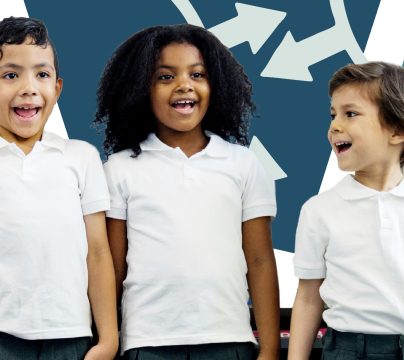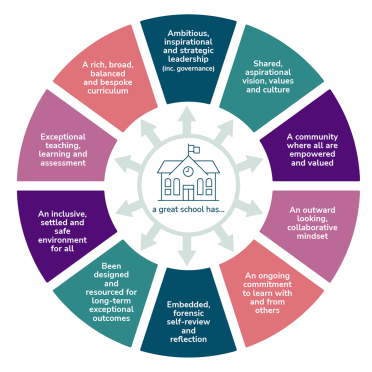The great school has very high expectations of the behaviour of pupils and the relationships between them, based on mutual respect, trust and kindness.
- All staff, pupils and the wider community have a shared understanding of the importance of wellbeing and their role in enabling others to flourish.
- All staff are committed to the school’s behaviour for learning policy and empowered to implement the procedures and systems consistently.
- Pupils are trusted to behave responsibly and to self-regulate their behaviour effectively.
- Systems for recognising and celebrating effort and success lead to a positive growth mindset.
- High expectations are reinforced by the use of appropriate consequences.
- Any incidents of bullying or prejudice-related behaviour are dealt with swiftly and effectively.
- Pupils are supported with and taught about healthy lifestyles and mental health issues: how to manage risks, build successful relationships, manage emotions and act responsibly as future citizens.
- Individual classrooms and learning areas are structured to enable pupils’ independent and autonomous learning, their ownership of and responsibility for spaces and risk-taking within a safe environment.
- The needs of those with SEND and disadvantaged learners are prioritised and met.
- The voice of all pupils is heard and valued.
- Staff and pupils feel safe when offering an opinion, whilst showing respect for the views of others.
Considerable attention is paid to the whole school environment and the quality of the daily experience of those who work and learn in the school: the entrance foyer as a welcoming area, the playground, lunch facilities, toilets, corridors, staff and student learning areas and social spaces as bright, safe and quality places. A stimulating visual backdrop to learning that reflects the whole school population is created by the presentation of a wide diversity of learners’ work: whole-school displays and exhibitions, learning walls, the use of photographs, pictures, images and quotations. Displays are age-appropriate, stimulate learning, celebrate attainment and progress and raise aspirations.
The school is outward-facing, welcoming to parents and the community, inviting and encouraging them into school to engage in the learning of their children and learn themselves.
This lens will typically be reflected in:
- School vision/mission statement
- SEND Policy and SEND provision map
- Equal Opportunities Policy
- Accessibility Policy
- EAL Policy
- Health and Safety Policy and procedures including accident logging
- Wellbeing Policy
- Health and Attendance Policy
- Anti-bullying Policy and bullying log
- Praise & Rewards/Recognition Policy
- Behaviour and Exclusions Policy
- PSHE Policy
- Extremism training for staff and pupils
- Display and Physical Environment Policy
- Safeguarding Policy and procedures: implementation of safer recruitment procedures, fully compliant SCR etc.
- Child Protection Policy and procedures
- CPOMs, CP logs, EP referrals, CAMHS referrals
- TAFs, EIPs, EHC plans
- Occupational Health reports and employee relations advice and support
- Attendance records
- Assembly records
- Language for Learning Policy
- Premises plan
- Pupil Progress meeting records
- Risk register and risk assessments
- Pupil Premium reviews and trackers
- Governor visits and reports
General documents, policies and procedures in which you might typically see the lenses reflected.
Case studies
Resources
-
Summer 2021
Young People on the Margins Ed Loic Menzies and Sam Baars, 2021
The Governance Handbook for SEND and Inclusion - Adam Boddison, 2020
An Educator’s Guide to Mental Health and Wellbeing – James Hollinsley, 2018
The Forgotten Third. Do a Third have to Fail for Two Thirds to Pass? – Ed Roy Blatchford, 2020
Addressing Educational Disadvantage In Schools and Colleges – Ed Marc Rowland, 2021
Wellbeing in the Primary Classroom – Adrian Bethune, 2018
Teacher Wellbeing and Self Care – Adrian Bethune, 2020
Spring 2020
Center on the Developing Child at Harvard
Autumn 2019
DfE Keeping Children Safe in Education
DfE Working Together to Safeguard Children
TED talk by Nadine Burke on how childhood trauma affects health across a lifetime (ACE)
Eastern Partnership (SEND) APTGo
Great Expectations: Leading an Effective SEND Strategy in School - David Bartram, 2018
Narrowing the Attainment Gap: a Handbook for Schools - Daniel Sobel, 2018
Behaviour Buddy blogs - Robin Launder

Ways in which HFL can provide support
SEND audits and reviews – SEND team
PSHE, behaviour, mental health and SRE audits – Wellbeing team
Safeguarding reviews – all phases
Risk assessment creation, equality act advice, occupational health support, stress awareness training – HR Services
Pupil premium reviews – all phases
Support with using the Making the Difference Toolkit
Annual or termly safeguarding reports presented to the Governing Board
Governor training specific to safeguarding, the safeguarding governor link role and safer recruitment
Exclusions training - Governance Services
Please contact us for further information on 01438 544464 or email info@hfleducation.org
The Great School Framework is made up of:
Ambitious, inspirational and strategic leadership (inc. governance)
Shared, aspirational vision, values and culture
A community where all are empowered and valued
An outward looking, collaborative mindset
An ongoing commitment to learn with and from others
Embedded, forensic self-review and reflection
Been designed and resourced for long term exceptional outcomes
An inclusive, settled and safe environment for all
Exceptional teaching, learning and assessment
A rich, broad, balanced and bespoke curriculum
The Great School Framework is the intellectual property of HFL Education and copyrighted. It may not be used unacknowledged by others.


